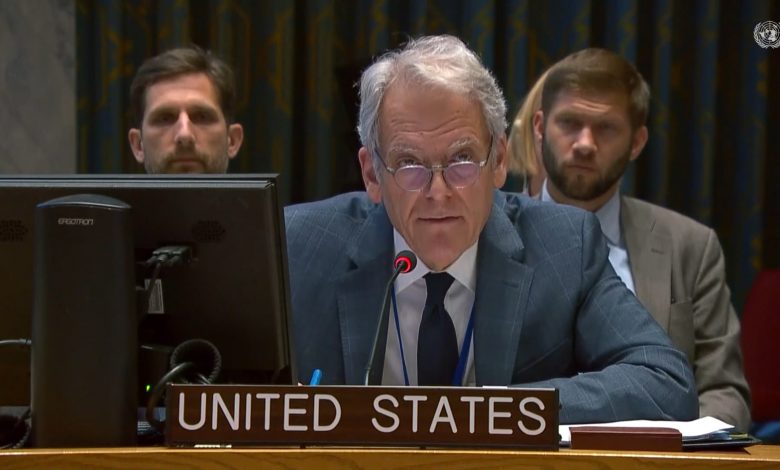Remarks at a UN Security Council briefing on the political and humanitarian situation in Syria

Ambassador Jeffrey DeLaurentis
Deputy Representative to the United Nations
New-York, New-York
June 29, 2023
AS DELIVERED
Thank you Mr President. And thank you, Deputy Special Envoy Rochdi and Under-Secretary-General Griffiths for your briefings.
As the Under-Secretary-General pointed out, the United Nations’ permit for cross-border shipments of humanitarian aid via Bab al-Hawa expires in just 11 days.
Last month in this Chamber, Ambassador Thomas-Greenfield called on the Council to extend and broaden this mandate by 12 months and to include the Bab al-Hawa, Bab al-Salam and al-Rai crossings. This is the only way to ensure that the Syrian population gets the help they need.
Since then, several key voices have endorsed three transitions – notably the Gulf Cooperation Council’s foreign ministers. The June 8 statement “expressed support for including all currently open crossing points – Bab al-Hawa, Bab al-Salaam and al-Rai – in a Security Council resolution to be adopted in July this year .” Your words carry weight.
The Secretary-General’s standalone report of June 10 makes clear that humanitarian needs in north-west Syria have never been greater and that an authorization for less than 12 months would be insufficient. We hear the Under-Secretary-General just repeat that point. As the Secretary-General explained, this remains “a moral and humanitarian imperative”. The report also highlights that early recovery projects take more than six months to plan and implement.
OCHA’s latest report also shows that over the past 18 months, more than $750 million has flowed into early recovery in 14 governorates in Syria. That includes over $112 million in early recovery in the last two months alone. NGOs have also pointed out that 90% of the 4.5 million people in north-west Syria depend on humanitarian aid to survive.
We supported all aspects of Resolution 2672 and welcome last week’s successful cross-border delivery to the Northwest and last month’s successful cross-border mission to Tel Abyad, the first since 2019. We applaud the United Nations for their tireless engagement with parties on the ground . Even as we encourage further cross-border assistance to all parts of Syria, it is evident that cross-border assistance remains essential.
To be clear, the Assad regime chose to make UN access unpredictable, and the Syrian people are suffering the consequences. The regime has also shown no signs of committing to an indefinite extension of UN access.
For this reason, a Security Council resolution providing for a 12-month extension for all three border crossings – Bab al-Hawa, Bab al-Salam and al-Rai – is essential. The humanitarian community needs the predictability that such a resolution would provide.
Donors, including the United States and other countries who are here today, have stepped up to meet the need. On June 15, at the Brussels VII conference, they pledged nearly $10 billion. The United States announced an additional contribution of US$920 million – our largest contribution ever. Last year, the international community pledged nearly $7 billion. The year before, it was nearly $6 billion. Given these needs, we encourage other countries to complement their rhetorical support with financial contributions.
These funds have helped feed the Syrian people, who for more than a decade have experienced inadequate nutrition, inadequate shelter, attacks on health and education facilities, and limited services as a direct result of Assad’s war on the Syrian people. But donations alone are not enough.
Beyond donor support, the Security Council has a responsibility to ensure aid reaches those in need. The best and most cost-effective option to ensure safety and flexibility for humanitarian operations is a 12-month extension that includes all three crossings – Bab al-Hawa, Bab al-Salam and al-Rai.
The Assad regime remains a major obstacle to humanitarian aid as it undermines the cross-border mechanism and prevents cross-border shipments to Rukban. The regime and its Russian backers have continued to attack hospitals and other civilian facilities – including attacks just last week that injured displaced civilians in Idlib. Russia’s role in the recent escalation in violent attacks in Idlib is a grim reminder of the long history of brutality against the Syrian people in this 12-year conflict.
We are concerned about the recent violence in north-west and north-east Syria. We condemn all attacks on civilians and call on all parties to condemn attacks on civilians in violation of international law.
The Syrian people do not need more violence, they need a more constructive dialogue. We note with frustration that the Constitutional Committee last met 13 months ago. We urge the regime to resume and participate in good faith in the meetings of the Constitutional Committee in Geneva.
In this situation, the conditions for the safe, voluntary and dignified return of refugees are still not in place and will not be until the Assad regime ceases its killings, arbitrary detentions, enforced disappearances, torture and other ill-treatment of the Syrian people refugee returnees.
We urge Russia and the League of Arab States to put pressure on the regime to contribute to the necessary conditions for return by clarifying the status of 135,000 missing persons, waiving conscription and housing insecurity -, land and ownership issues.
The only way to end the suffering of the Syrian people remains a political solution in line with UN Security Council Resolution 2254. We encourage Syria’s neighbors to urge Assad to engage meaningfully in the United Nations-sponsored process and join us in supporting civil society in the pursuit of justice and accountability for human rights violations and abuses.
Thank you, Madam President.
###


